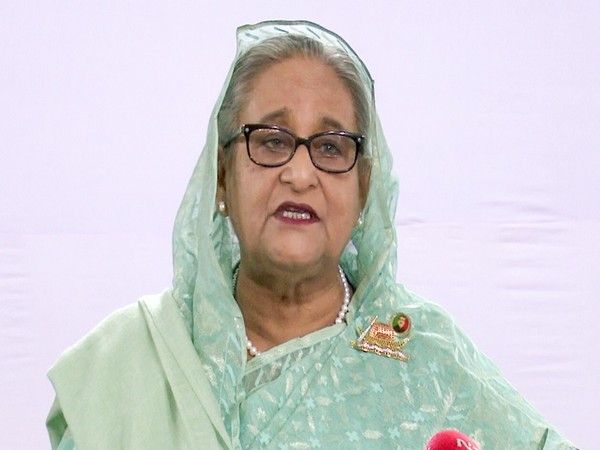Sheikh Hasina Faces New Wave of Legal Challenges Amid Political Turmoil
At least nine additional complaints have been filed against former Prime Minister Sheikh Hasina, increasing the total cases against her to 31. The charges include 26 cases of murder, four for crimes against humanity and genocide, and one for abduction. Legal troubles for her aides and family members are also rising.

- Country:
- Bangladesh
At least nine more complaints were filed on Tuesday against deposed former prime minister Sheikh Hasina and her aides, bringing the total number of cases against her to 31, including 26 on murder charges, four on crimes against humanity and genocide, and one for abduction.
Supreme Court lawyer Gazi MH Tamim lodged a complaint with Bangladesh's International Crimes Tribunal on behalf of Mufti Harun Ijahar Chowdhury, joint secretary general (education and law) of Hefajat-e-Islam, as reported by The Daily Star.
The complaint accused Hasina and 23 others of committing crimes against humanity and genocide during a Hefajat-e-Islam rally at Motijheel's Shapla Chattar on May 5, 2013.
"We registered the complaint, and thus the investigation has started from today," Deputy Director (admin) of the investigation agency Ataur Rahman was quoted as saying by the newspaper.
This marks the fourth complaint filed against the former premier with the International Crimes Tribunal. Hasina resigned and fled to India on August 5 amid massive protests against her regime.
Of the four, three cases are tied to the recent violence surrounding the quota reform movement.
Additionally, eight new cases were filed against the Awami League chairperson on Tuesday across the country, accusing her of killings during recent protests.
With these cases, Hasina now faces 31 cases, including 26 on murder charges, four on crimes against humanity and genocide, and one for abduction.
For the first time, Hasina's son Sajeeb Wazed Joy, daughter Saima Wazed Putul, and sister Sheikh Rehana were made co-accused in a killing case.
Notable figures accused in the Hefajat-e-Islam case include Awami League general secretary Obaidul Quader, former minister Rashed Khan Menon, ex-mayor Sheikh Fazle Noor Taposh, ex-advisor Salman F Rahman, ex-security advisor Tarique Ahmed Siddique, former police inspector general AKM Shahidul Haque, ABnews24.com editor Subhash Singha Roy, and ex-army chief Aziz Ahmed.
Some unnamed ministers, state ministers, lawmakers, individuals from law enforcement agencies, and policymakers of some electronic and print media were also accused.
According to the complaint, the accused committed crimes against humanity and genocide by killing Hefajat activists in Dhaka and surrounding areas between May 5 and 6, 2013, the paper stated.
The Hasina government established the International Crimes Tribunal in March 2010 to prosecute those who committed war crimes in 1971. A second tribunal was later formed, leading to executions of five Jamaat-e-Islami and a Bangladesh Nationalist Party (BNP) leader following verdicts.
BNP's Secretary-General Mirza Fakhrul Islam Alamgir has asked India to extradite Hasina to face trial, accusing her of plotting to thwart the country's revolution.
Hasina, her son Sajeeb, daughter Saima, sister Rehana, and 17 others were sued over the killing of a fruit seller in Dhaka's Jatrabari on August 5, as reported by the newspaper.
The victim's father, Sultan Miah, filed the case with the Dhaka Metropolitan Magistrate Md Shakil Ahmed's court.
Another case was filed against Hasina and 49 others regarding the death of Md Omar Faruque, a student, in Sutrapur on July 19.
Hasina and 24 others were also sued for the death of garment worker Sohel Rana in Dhaka's Adabor area on August 5.
In Savar, Hasina and 75 Awami League members were sued over the murder of a barber shop worker. In Narayanganj, a case was filed against Hasina, former ministers, lawmakers, and 179 others for killing a bus helper in Kanchpur. In Rangpur, Hasina, her sister, and 49 others were sued over the killing of a vegetable trader during the quota reform movement on July 19.
In Joypurhat, a murder case was filed against Hasina along with 216 others in connection with the death of an auto driver on August 5. In Bogura, Hasina and Obaidul Quader were sued for the murder of a rickshaw puller on August 4.
Meanwhile, the interim government stated it did not shut down any media outlets, affirming its belief in a free press and freedom of speech, according to a press release from the Chief Adviser's Press Wing. Over 230 people were killed in violence that erupted following the fall of the Hasina-led Awami League government, raising the death toll to more than 600 since protests began in mid-July.
An interim government replaced the Hasina-led government, with Nobel laureate Muhammad Yunus named as the Chief Adviser.
(With inputs from agencies.)
ALSO READ
Petition for Political Ban on Awami League Withdrawn: Bangladesh's Political Landscape in Flux
Showdown in Bangladesh: Awami League Accused of Fascism Amid Rally Ban
Bangladesh Awami League Faces Counter-Protests Amid Legal Battles
US Raises Alarm Over Crackdown on Awami League Supporters in Bangladesh
Student Movement Halts Awami League Rally in Bangladesh










